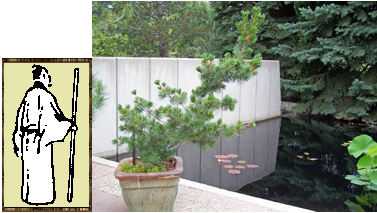
Hexagram Thirty-five—Promotion
Hexagram Thirty-five shows a feudal prince who has done a good job in governing the people, thus receiving horses and audience with the king.
The first line, yin, shows one who desires a promotion, but is frustrated because it does not come. Steadfast and undisturbed, this person will soon meet with good fortune.
The second line, yin, shows the blessings of one's grandmother. Peace of mind will soon come to one who is advancing in the material sphere, but who believes there is more to life than money and power.
The third line, yin, shows one who wins the approval of peers and associates. Acceptance relieves all regrets.
The fourth line, yang, shows one who tries to make advancement like a burrowing rodent—greedy, untrustworthy, and mistrustful of others. Even great effort will not overcome the danger in this attitude.
The fifth line, yin, shows that promotion will come to one who is not attached to success or failure.
The sixth line, yang, shows one who takes it upon themself to control and punish others, just as a bull pushes others around with his horns. This is a dangerous position to take, and although some good may come of it, there will also be self-inflicted emotional pain.
Hexagram Thirty-five Commentary
Validation for good work may come in many ways. The introduction shows a feudal prince who is rewarded with a promotion that includes "horses and an audience with the king.
The first line, yin, shows its subject waiting for a promotion, but feeling frustrated because it's taking so long. The advice is to keep working and the promotion, or something better, will come.
The second line, yin, shows one who advances in the material sphere, but at the same time maintains faith there is more to life than money and power. The line says this person works under the blessings of the grandmother. This symbolizes peace of mind that may be passed down through generations.
The third line, yin, shows that rather than material rewards, the real reward people seek is "approval of peers and associates." When they feel accepted and part of what matters, and this "acceptance relieves all regrets."
The fourth line, yang, shows the most negative attitude possible. The subject of this line "tries to make advancement like a burrowing rodent—greedy, untrustworthy, and mistrustful of others." This no way to get ahead in life and will not lead to social acceptance or rewards. It's simply a dangerous way to live.
The fifth line, yin, returns to the detachment of the person in the second line. Living a good life, working without attachment to success or failure, is the right attitude.
The sixth line, yang, exposes another negative attitude in regards to reward. It shows a person who feels a duty to control and punish others, "just as a bull pushes others around with his horns." The line notes that although some good may come from it, the person also feels "self-inflicted emotional pain."
To the reader: Most of the hexagrams have at least one line that predicts bad results, but that does NOT mean you are fated to that result. The hexagrams illustrate different attitudes, so study the actions and reactions to learn the attitudes that will lead to better outcomes.
The I Ching teaches you to flow with changes and create positive change from the inside through conscious living. Your future is in your hands. Consult the I Ching for ideas that lead to clear thinking and positive mental attitude. Reading the I Ching helps you take the time to reflect on your attitudes and ideas. Continue asking until you feel positive about your course.

Click here for another hexagram.
A note about this interpretation of the I Ching: Nori Muster wrote this version of the I Ching in 1994 and put it online at Surrealist.org in 2000. It is also available at Amazon:
e-book
paperback
